democracynow.org
Stories:

Pastor: Acquittal in Freddie Gray Case Highlights Deep Distrust in Legal System in Black Community
A Baltimore police officer has been acquitted on all charges for his role in the arrest of Freddie Gray, who died of spinal injuries last year after he was arrested and transported in a police van. Officer Edward Nero faced misdemeanor charges of second-degree assault, reckless endangerment and two counts of misconduct in office. Nero was one of six officers charged in Gray’s death. Judge Barry Williams handed down the verdict in a bench trial on Monday, ruling that "the state has not met its burden" to prove Nero’s guilt "beyond a reasonable doubt." The ruling was met with little surprise from the community in a case that many said was the state’s weakest. We speak with Gray family attorney Billy Murphy, who recently won a $6.4 million settlement from the city of Baltimore for the family of Freddie Gray, and Rev. Heber Brown III, pastor of Pleasant Hope Baptist Church and member of Baltimore United for Change.
TRANSCRIPT
This is a rush transcript. Copy may not be in its final form.
AMY GOODMAN: We begin today’s show in Baltimore, where a police officer was acquitted on all charges for his role in the arrest of Freddie Gray, who died of spinal injuries last year after he was arrested and transported in a police van. Officer Edward Nero faced misdemeanor charges of second-degree assault, reckless endangerment and two counts of misconduct in office. A total of six officers were charged; four were directly charged in Gray’s death. Judge Barry Williams handed down the verdict in a bench trial Monday, ruling "the state has not met its burden" to prove Nero’s guilt "beyond a reasonable doubt." The ruling was met with little surprise from the community in a case that many said was the state’s weakest; however, a few protesters gathered outside the courthouse and expressed disappointment in the verdict.
PROTESTER: This is not right. That boy’s back got broke. He’s dead. If something happened to my son, I would put myself in that mama’s shoe and that family’s shoe. That is not right. That verdict is not correct. He should have gotten something. Somebody got to be responsible for that murder.
AMY GOODMAN: Freddie Gray died in April from a spinal injury sustained while being transported in the back of a police van. Gray’s family and attorney say his voice box was crushed and his spine was, quote, "80 percent severed at his neck." Nero was one of six officers charged in Gray’s death. Officer William Porter was the first one to go to trial, charged with involuntary manslaughter, second-degree assault, reckless endangerment and misconduct in office. In December, Judge Williams declared a mistrial in Porter’s case after jurors were unable to reach a verdict on any of the charges after three days of deliberation. Now all eyes are on the upcoming trial of officer Caesar Goodson, the driver of the police van and the only officer charged with murder in Gray’s death.
For more, we’re joined by Gray family attorney Billy Murphy, who recently won a $6.4 million settlement from the city of Baltimore for the family of Freddie Gray. Also with us is Dr. Heber Brown, pastor of Pleasant Hope Baptist Church and member of Baltimore United for Change.
We welcome you both to Democracy Now! And I want to begin with Pastor Heber Brown. Your response to the acquittal?
REV. HEBER BROWN III: Well, as you said, Amy, it is no surprise to those of us who recognize that justice in the courts, especially for black folk in this country, is oftentimes more marathon than sprint. And so, people here are looking at ways to continue organizing in our local communities. We’re not waiting with bated breath for the decision of any judge or jury to determine what justice looks like or should look like in our communities.
AMY GOODMAN: Billy Murphy, you’re the attorney for the Gray family. What was their reaction?
BILLY MURPHY: Their reaction was the same as it was to the hung jury and to the run-up to these trials, and that is that justice didn’t have a word "guilty" attached to it, or "not guilty." Justice is the result of a fair process where both sides present all of their evidence, and the judge makes as fair a ruling as he’s capable of doing by applying the law and finding the facts. And as long as that was done, the family is satisfied, because they didn’t put their fingers on the scale here. They didn’t think in advance, "I want that officer to be found guilty." Rather, they let the system do its job. And they had confidence in the system, because they had a black judge who was exceptionally qualified because he was a former prosecutor of police misconduct for the federal government for six years. And they believed that both sides were capable of presenting their case, and they left it up to that designated representative of our community, Judge Williams, to make the decision.
Now, it would be different if there was a lack of confidence in him as the process, but so far the community is exceptionally happy with Judge Williams’s handling of these cases. And they have full confidence that he’s able and willing to administer justice. He also showed the community that he wasn’t willing to be swayed by any segment of the community in determining for himself whether or not, based on all the evidence, the officer was guilty or not guilty. And for that, we all applaud him, because judges should be above the pressures of the community. And this is our turn to put the pressure on the system. And we don’t want to be in a position where that pressure causes a miscarriage of justice; rather, we want everybody to play their normal role in the normal fashion, with exceptional people in charge of the decision.
AMY GOODMAN: After the not guilty verdict was handed down in the case against Officer Nero, Baltimore Bloc, a grassroots social justice coalition, tweeted, quote, "We do not believe it was Mosby’s intent to seek justice for Freddie Gray; truly doing so would mean upsetting the status quo in which she is all too comfortable, and it would mean risking her office’s relationship with the corrupt and brutal Baltimore Police Department. The type of illegal arrest that led to Freddie Gray’s death is the same type of arrest that leads to Mosby’s office prosecuting people like Freddie Gray every day." Pastor Heber Brown, your thoughts?
REV. HEBER BROWN III: Well, I think that is an example of the growing discontent with not only the legal system, but all the systems here in Baltimore. Mr. Murphy is a expert jurist here and has knowledge of the inner workings of how the legal system works. But for everyday people, for laypeople like myself who don’t have that level of expertise, there is a great frustration with the pace of this case and the results of the case, as well, especially when you consider, Amy, that those who were charged in vandalizing stores were convicted with a great, deliberate speed, but it seems like those who were involved or connected in the death of Freddie Gray, the process slows down to snail’s pace.
And so I think that statement is an example of what I spoke of earlier, that people more and more are saying, "Enough with looking to the legal system or to City Hall to provide justice for us. We can work ourselves." And so, with Baltimore United for Change, we are involved in organizing and building for power. And what that means on the ground is establishing black-led organizations, supporting black-led organizations, from public policy think tanks to freedom schools to solidarity economies and cooperative economics, to even an alternative food system. We are taking the role and responsibility to define what justice should look like for us, instead of waiting for these systems to tell us what justice should look like.
AMY GOODMAN: While none of the six officers have yet to be found guilty in the death of Freddie Gray, Allen Bullock, an 18-year-old who turned himself in for participating in last year’s uprising, pleaded guilty in February. He agreed to a deal that included a 12-year prison sentence with all but six months suspended, five years’ probation after serving that term, 400 hours of community service, and he has to earn his high school equivalency certificate. Bullock had faced a bond of half a million dollars, higher than any of the officers. This is Allen’s stepfather, Maurice Hawkins, and his mother, Bobbi Smallwood, last year speaking to The Guardian.
MAURICE HAWKINS: That’s my son on top of the police car with the cone in his hand, hitting the window. We don’t condone that, and we believe in peace. I just want justice to be held and not to be—you know, him looked at as a career criminal or a thug.
BOBBI SMALLWOOD: My son, he’s not a evil child. I mean, he’s not somebody that go around and just hurt people. He’s really not. He was really upset about them police who’s just walking free. You gave my son a half-a-million-dollar bail for breaking a police window, and you gave these cops nothing? Nothing for murder? That’s crazy. That’s crazy. That’s not fair.
MAURICE HAWKINS: That’s not justice.
BOBBI SMALLWOOD: That’s not fair.
AMY GOODMAN: Gray family attorney Billy Murphy, your response?
BILLY MURPHY: I think they have a legitimate grievance. And I think that there is disparity in the system for bail. I think judges are more afraid than ever not to give these ridiculously high bails, which are totally unjustifiable. Neither the officer nor this kid deserved a bail anywhere near that. And indeed, you could make an argument that both should have been released on their own recognizance without having their families burdened by the bail system, where they no longer have the resources left to hire a lawyer after they get the person out on bail. This has been a problem for a long time, and we’ve fought hard against it. Many of us got together to help professor—a professor at the University of Maryland to assure that lawyers are present at bail hearings, because up until last year, it wasn’t done in Maryland. So there are lots of problems with this criminal justice system that make the outcomes in many of these cases, far too many, totally unfair. And I agree with everything she said. But I don’t think it’s one or the other. I think both were inappropriately—bails were set inappropriately in both cases. Why a million-dollar bail for a police officer who’s not going anywhere? There’s no place for him to go. And he’s not going to commit a crime while he’s out on bail, because he’s not even on duty. Why a bail so high for a kid like this in an incident that’s seemingly so minor? Why so high a suspended sentence, when the mother’s point of view and the father’s point of view are correct? And until we straighten out this excessive sentencing and these excessive bails, this system will be far from fair, not only to black people, but to poor people across the country, and especially in Maryland, which is a progressive state, relatively speaking. So, there’s a lot of work to do on this system. And the reforms are nowhere near complete.
AMY GOODMAN: Pastor Brown, I wanted to get your response to Gene Ryan, president of the Baltimore City Fraternal Order of Police, who issued a statement Monday in response to the Nero verdict. He said in part, quote, "Officer Nero is relieved that for him, this nightmare is nearing an end. Being falsely charged with a crime, and being prosecuted for reasons that have nothing to do with justice, is a horror that no person should ever have to endure. ... None of these Officers did anything wrong. The State Attorney’s office responded to the riots and violence in Baltimore by rushing to charge these Officers rashly and without any meaningful investigation." Pastor Brown, your response?
REV. HEBER BROWN III: Yeah, well, the nightmare continues for black people in Baltimore. The nightmare has been generations long. I mean, everybody knows the name of Freddie Gray now. People don’t know the name of Thomas Broadus, a black man killed by a Baltimore City police officer in the 1940s. Many of you don’t know the name of Tyrone West, a black man killed by 12 to 15 Baltimore City police officers just a couple of years ago. And so, you know, while he might be glad that the nightmare is over for Officer Nero, we’re living in a nightmare. When you have one in four Baltimoreans living in a food desert; when you have young people who go to schools that have lead in the pipes, in the water, so they can’t drink from the water fountains; when you have unemployment, record unemployment highs; when you have developers who get tax breaks from City Hall while our communities are suffering and falling apart, our nightmare continues and will continue. And we’re not waiting anymore for any Wizard of Oz in City Hall or anybody else to do for us. I am a part of a growing group of people who have a frustration with the system as it stands, are not waiting around, but are using what God has given us to build the systems and structures that we need and build for power in Baltimore, because waiting for any of these systems is not going to work.
BILLY MURPHY: And by the way, we both speak from experience, personal experience, with the system. I was brutalized and arrested, in the process of the arrest, brutalized by being thrown face-first into a set of lockers by an officer in Anne Arundel County, who arrested me for nothing, pure spite because of my aggressive representation of someone in front of a commissioner. Fortunately, I was acquitted. But I had to hire a lawyer, and I had to fight against that unfair and unnecessary charge against me. Incidentally, instead of my being released on my own recognizance, the commissioner put a $5,000 bail on me. And I asked her, "Why did you do that? You know I’m a lawyer. I’m not going anywhere." She said, "Frankly, Mr. Murphy"—a white woman—"Frankly, Mr. Murphy, I think you’re a danger to the community." Well, you know, there it is. Black lawyer. What other danger do I present?
AMY GOODMAN: Last year I spoke to Kevin Moore, who lives in the Gilmor housing projects, actually filmed part of the arrest of his friend, Freddie Gray. Moore talked about the relationship between the community and the police.
KEVIN MOORE: I’ve been through so much personally in my life in West Baltimore. It’s just a hard place to grow up in, you know? And basic survival is all we concentrate on, you know? So, in light of that, it’s like, what do you do when you’re placed in a position where you have people that are supposed to come and serve and protect in the police, right, but you can’t trust them because they brutalize people, they hurt people, they dehumanize people? You know what I’m saying? And it’s very belittling to me when you say we’re supposed to trust you, when you can come out with the police bill of rights and protect these animals from the very laws that they break. It’s amazing to me.
AMY GOODMAN: Pastor Heber Brown, your response, as well as, as we wrap up on this issue, what the schedule is now of the trials, and what is happening in the community?
REV. HEBER BROWN III: Yeah, well, we’re continuing to organize in the community. We’re continuing the tradition of what our ancestors and elders have always done. They’ve created spaces and institutions to advance what they feel to be their priorities and to address the material conditions of their communities, from the Mississippi Freedom Democratic Party to the Black Panther survival programs to the Freedom Schools of 1964. We come from a long tradition of people who find creative ways to address our material conditions. That will continue. We’ll continue to observe and keep eyes on what’s going on in the legal structure, but, as I said earlier, we are not holding our breath in Baltimore. We’re going to continue to organize within our communities on solidarity economies, freedom schools, public policy think tanks, alternative food systems and so much more, to do for ourselves, because, as Maya Angelou said, when people show you who they are, believe them. We believe that this system is wicked and immoral and grossly and woefully deficient, and we will not wait anymore for it to provide for us what we know we have the right to.
BILLY MURPHY: And I agree 100 percent with everything he’s just said. Don’t let the smile fool you.
AMY GOODMAN: Well, finally, Billy Murphy, I wanted to ask you about a different issue, the issue of Flint, Michigan. In February, you brought a federal class action lawsuit against state and local officials in Flint over lead contamination of the city’s drinking water. Can you tell us the state of this class action suit, who you’re representing and what you expect to come out of it?
BILLY MURPHY: Yes, we filed a class action suit in Flint, Michigan, to get a—it was a simple suit—to get a refund for all of the water bills that had been paid for the two years that that water was undrinkable and otherwise unusable. Absolutely fair case. We brought it under the federal Constitution, because we alleged that the government interfered with the contract that the citizens of Flint had with their city, that the water would come from the Detroit, Michigan, source, which was clean, and instead the special manager out there, who took over the entire government by governmental fiat, switched the water supply on the citizens without making the proper precautions, making that water undrinkable. And so, that’s the suit that we filed in Michigan.
AMY GOODMAN: Well, I want to thank you both for being with us. Again, Billy Murphy is the attorney for the Gray family, for Freddie Gray’s family, who was killed in April of 2015 in police custody. Six police officers are on trial. One had a mistrial. Now another has been acquitted. And because—with the mistrial, there are still five trials to go. Also, Billy Murphy is representing the class action suit dealing with the contamination of Flint’s water supply. And, Dr. Heber Brown, thanks so much for being with us, pastor at the Pleasant Hope Baptist Church in Baltimore.
This is Democracy Now! When we come back, we’ll talk about Honduras. Who’s been arrested for the death of the world-renowned environmentalist Berta Cáceres? Stay with us. ... Read More →

Obama Urged to Stop Funding Honduran Military as Questions Grow over U.S. Role in Berta Cáceres' Death
Department of Homeland Security Secretary Jeh Johnson has returned from a visit to Tegucigalpa, where he met with Honduran President Juan Orlando Hernández to discuss migration and security. Johnson’s visit comes as a growing number of activists in Honduras and in the United States are calling on the United States to stop funding the Honduran military, over accusations that state security forces have been involved in human rights violations, extrajudicial killings—and the murder of internationally renown environmentalist Berta Cáceres. Before her death, Berta and her organization COPINH was long the target of repression by elite Honduran security forces and paramilitary organizations. Earlier this month, four people were arrested in connection with her murder, including Army Major Mariano Díaz Chávez and Edilson Duarte Meza, who is reportedly a retired captain. Press accounts report Díaz Chávez graduated from the prestigious U.S. Ranger-supported Honduran special forces course TESON, raising questions about whether U.S.-trained troops were involved in carrying out Berta’s murder. We speak to Annie Bird, director of Rights & Ecology, a project of the Center for Political Ecology.
TRANSCRIPT
This is a rush transcript. Copy may not be in its final form.
AMY GOODMAN: We turn to Honduras. The Department of Homeland Security secretary, Jeh Johnson, has returned from a visit to Tegucigalpa, Honduras, where he met with the Honduran president, Juan Orlando Hernández, to discuss migration and security. Johnson reiterated the United States’ pledge to continue providing hundreds of millions of dollars in funding to Honduras through the Northern Triangle’s Alliance for Prosperity Plan. According to the White House, out of the $750 million slated for Honduras, El Salvador and Guatemala, $222 million is allocated for international narcotics control and law enforcement, while an additional $30 million is allocated for foreign military financing and military education and training.
Johnson’s visit comes as a growing number of activists in Honduras and in the United States are calling on the U.S. to stop funding the Honduran military, over accusations that state security forces have been involved in human rights violations, extrajudicial killings—and the murder of internationally renowned environmentalist Berta Cáceres. Before her death, Berta and her organization, COPINH, was long the target of repression by elite Honduran security forces and paramilitary groups. Only hours before she was killed, Berta Cáceres gave a workshop in her hometown of La Esperanza, where she accused the military, including the U.S.-funded special forces TIGRES unit, of working on behalf of international corporations.
BERTA CÁCERES: [translated] We have to understand why these projects are so important. The government has all of its institutions at the service of these companies, because they are capable—as in Río Blanco, in the defense that we had in Gualcarque—because these businesses are capable of moving antiterrorism commandos, like the TIGRE commandos, the military police, the national police, security guards, hit men, etc.
AMY GOODMAN:That was Berta Cáceres herself, criticizing the Honduran military. Only hours later, Berta was killed in her home by armed gunmen. Earlier this month, four people were arrested in connection with her murder, including Army Major Mariano Díaz Chávez and Edilson Duarte Meza, who is reportedly a retired captain. Press accounts report Díaz Chávez graduated from a prestigious U.S. Ranger-supported Honduran special forces course, raising questions about whether U.S.-trained forces were involved in carrying out Berta’s murder. Her family continues to call for an independent investigation into her death.
For more, we’re joined by Annie Bird, the director of Rights & Ecology, a project of the Center for Political Ecology, which tracks the connections between economic and development policy and human rights violations.
Annie Bird, welcome back to Democracy Now!
ANNIE BIRD: Thank you.
AMY GOODMAN: Can you talk about the latest in Honduras, what you understand Jeh Johnson, the Homeland Security secretary, was doing in Honduras, and the latest on those arrested for Cáceres’s murder?
ANNIE BIRD: Well, Secretary Johnson was visiting to Honduras to witness the return of deportees from the United States to Honduras. He said that since October of last year, over 22,000 people have been deported to Honduras and El Salvador, and so he was witnessing the return of some of those people. But the problem is that, you know, the U.S.—and what we see in the case of Berta Cáceres, is that the U.S. continues to support economic policies that are generating this exodus of people, as well as military and security forces that are involved in human rights abuses and are widely perceived by the population to be part of the violence—and there are many cases that illustrate this—and at the service of organized crime and the interests that are generating so much instability and violence.
AMY GOODMAN: Annie Bird, can you talk about who’s been arrested for Berta Cáceres’s murder, and go through each person?
ANNIE BIRD: So, two of the people arrested were employees of a hydroelectric development company called DESA, which was building the Agua Zarca Dam, which Berta was a vocal—vocally campaigned against, because it affected the Lenca communities in the area. And so, one, Sergio Rodríguez Orellana, was an environmental engineer, and the narrative by the Public Prosecutor’s Office is that Rodríguez, with the help of Geovanny Bustillo, who had been a chief of security for the same company but was also a retired military officer, hired an active-duty military police instructor, who you mentioned, Mariano Díaz Chávez, to help plan the murder, and that he then hired two hit men—or three hit men, two of which, of the alleged hit men, have been arrested and were twin brothers. The first one, Edilson, Edilson was initially reported to be a retired military officer also, Edilson Duarte Meza, but then, as the reporting continued over the next few days, despite the spokesman for the Honduran military having affirmed that he was a retired captain, after a few days they began reporting that he had not been a military officer. And then his twin brother was also arrested, though at the time it was not reported. It was—he was only reported to have been arrested after his twin brother pleaded not guilty. And then prosecutors then prosecuted him for—in conjunction to the murder. And there’s a third material author, alleged material author, who is currently, you know, being looked for by the police.
AMY GOODMAN: Can you talk about the link between Major Mariano Díaz Chávez, one of those arrested, and the U.S. Ranger-supported Honduran special forces course called TESON?
ANNIE BIRD: Yes, Major Díaz is reported in the press to have served in Iraq, to have worked for multilateral peacekeeping missions, and also to have completed this elite, intense training program called the TESON training program, that the Rangers helped to start. So it’s almost undoubted that he has received at some point U.S. military training, and probably on multiple occasions. And, you know, this also raises concern, because in the thesis that I described of the company hiring him as a rogue officer to carry out these assassinations, people—there’s a lot of concern that what that narrative does is remove the crime from the chain of command, and that this killing may well actually have been a crime of the state. And so, when that thesis is prosecuted, it could be protecting people higher up in the military. And, you know, one of the flags that are raised is that Major Díaz was a rising star in the military. You know, he was among the military elite. And for him to do a rogue operation like this is not—does not seem very likely.
AMY GOODMAN: I’d like to turn to the words of Berta Cáceres’s daughter Olivia, who was on Democracy Now! She was at a mobilization in Tegucigalpa in March.
OLIVIA ZÚNIGA CÁCERES: [translated] Today, we are here to demand justice and an explanation for the crime of the death of my mother, Berta Cáceres. I’m her oldest daughter. And we’ve launched a struggle, a battle at the international level, to exert pressure in order to demand that the aid agencies that fund these multinational corporations that come to plunder, to exterminate our people, to spill our blood in our territories, to create territorial conflicts, that they stop being financed and that they leave our country, because we don’t want international companies that come to finance death, blood and extermination in our communities.
AMY GOODMAN: Annie Bird, I was wondering if you could respond to this. And also, since Berta Cáceres’s assassination, COPINH has reported multiple other attacks against activists, including the murder of Nelson García, who we have reported on. What happened to Nelson? What are these other attacks? And how is this linking up with the prosecution of those that the state is accusing of being involved with Berta’s murder?
ANNIE BIRD: Well, I think Olivia’s comments are very important, that this murder comes because of Berta’s defense of natural resources and of the rivers and of the Lenca people’s right to have their rivers and use them and benefit them—from them within their way of life. And the day of the killings—the day of the arrests, the very day that an active-duty military officer was arrested, the Honduran president began participating in a Central America energy summit with the different presidents of Central America and Joe Biden in the White House. And, you know, USAID and the State Department affirmed their commitment and even announced increased commitment to funding energy projects like the Agua Zarca Dam in Honduras, when there’s not—when the justice system is absolutely dysfunctional. There’s no way of protecting people from defending their basic rights to their means of livelihood, to their land. And there are dozens of projects like this being promoted throughout the country—palm oil production, hydroelectric dams, mines—which are taking away people’s access to a way of making a life for themselves and supporting their families, which is obviously something that fuels migration and the need to migrate.
And, you know, as you mentioned in the introduction of the program, the U.S. is affirming their commitment to the Alliance—the plan of the Alliance for Prosperity, and, you know, there’s this $750 million commitment from the White House. But in addition, there’s $22 billion of investment projected from the development banks. And the development banks are funding—the IFC, the private sector lending arm of the World Bank, doesn’t—I went with Berta last time she was in D.C., about a year ago, to present a complaint against 49 projects that take—that would take livelihood away from Lenca communities, to present a complaint to the private sector lending wing of the World Bank, saying—against these projects, and with the expectation that many of these are likely receiving funding from the World Bank, because so much of their money is going into the private—into private banks and investment funds. The IFC’s answer to that complaint was that they don’t really—they can’t tell if the IFC’s money is ending up funding any of these almost 50 projects that she denounced, because there’s not control, and the World Bank is not able to determine, really, whether it is complying with its mandate of eliminating poverty and promoting shared prosperity. And, in fact, communities across Honduras are saying that their investments are instead generating poverty and inequality, and increased inequality. In—
AMY GOODMAN: Annie Bird—
ANNIE BIRD: Uh-huh?
AMY GOODMAN: We’re going to be wrapping up in a minute, and I wanted to quickly ask about the calls of activists and Berta’s families for the U.S. to cut off military funding to the Honduran government.
ANNIE BIRD: Right. So, they’ve called for the cutoff of military funding and also the funding to these kinds of development projects. And they continue to demand the cutoff of military and security assistance. And, you know, I think the arrests earlier this month show that the Honduran security forces are deeply involved in, you know, human rights abuses. ... Read More →

As Hillary Clinton Defends Her Role in 2009 Coup, Is U.S. Aid to Honduras Adding "Fuel to the Fire"?
We speak with Annie Bird about Hillary Clinton’s role as secretary of state during the 2009 coup that ousted Honduran President Manuel Zelaya. "There’s no other way to categorize what happened in 2009 other than a military coup with no legal basis," Bird says. "The U.S. was not willing to cut off assistance to Honduras, and that is the only reason it was not called a coup, a military coup. At the time, activists like Berta called for the assistance to be cut off, and today her children are calling for it to be cut off, because the U.S. assistance is actually adding fuel to the fire and stoking the economic interests of the people behind the coup."
TRANSCRIPT
This is a rush transcript. Copy may not be in its final form.
AMY GOODMAN: Finally, I wanted to get your response to our colleague, Democracy Now!'s Juan González, raising the issue of Honduras with Hillary Clinton during a meeting with the New York Daily News editorial board. This was in the midst of the New York primary. And Juan asked about Hillary Clinton's decision at the time she was secretary of state in 2009 to not declare the ouster of then-president of Honduras, Mel Zelaya, a coup.
JUAN GONZÁLEZ: Do you have any concerns about the role that you played in that particular situation, not necessarily being in agreement with your top aides in the State Department?
HILLARY CLINTON: Well, let me again try to put this in context. The Legislature—or the national Legislature in Honduras and the national judiciary actually followed the law in removing President Zelaya. Now, I didn’t like the way it looked or the way they did it, but they had a very strong argument that they had followed the Constitution and the legal precedents. And as you know, they really undercut their argument by spiriting him out of the country in his pajamas, where they sent, you know, the military to, you know, take him out of his bed and get him out of the country. So this was—this began as a very mixed and difficult situation.
If the United States government declares a coup, you immediately have to shut off all aid, including humanitarian aid, the Agency for International Development aid, the support that we were providing at that time for a lot of very poor people. And that triggers a legal necessity. There’s no way to get around it. So, our assessment was, we will just make the situation worse by punishing the Honduran people if we declare a coup and we immediately have to stop all aid for the people, but we should slow walk and try to stop anything that the government could take advantage of, without calling it a coup.
AMY GOODMAN: That’s presidential candidate Hillary Clinton. She was secretary of state at the time of the coup against Mel Zelaya. Annie Bird, we have 30 seconds. Your response to what she said?
ANNIE BIRD: You know, there was just—there’s no other way to categorize what happened in 2009 other than a military coup with no legal basis. The U.S. was not willing to cut off assistance to Honduras, and that is the only reason it was not called a coup, a military coup. Today—and at the time, activists like Berta called for the assistance to be cut off. And today, her children are calling for it to be cut off, because the U.S. assistance is actually adding fuel to the fire and stoking the economic interests of the people behind the coup, supporting—you know, investing not in the poor, but in the wealthy and in the corrupt sectors of Honduras that are, you know, generating so much poverty and violence.
AMY GOODMAN: Well, I want to thank you very much, Annie Bird, for joining us, director of Rights & Ecology, a project of the Center for Political Ecology.
This is Democracy Now! When we come back, we’re going to go to the story of a high school student in North Carolina who was picked up on his way to school and targeted for deportation. He’s remained in jail for many months. Stay with us. ... Read More →

"Free Wildin": Teen Picked Up by ICE on His Way to High School Faces Deportation to Honduras
Students at Riverside High School in Durham, North Carolina, are gathering on Capitol Hill today to demand the release of their undocumented classmate, 19-year-old Wildin Acosta. Acosta was detained by immigration agents in January while he was on his way to class. He had no criminal record and was in his final semester of high school. Acosta’s family is from Olancho, Honduras, one of the most violent regions in a country with one of the highest murder rates in the world. Wildin was scheduled to be deported in March, but his teachers and peers gathered together, held vigils, lobbied their local representatives and took to social media. Wildin Acosta remains detained in Georgia’s notorious Stewart Detention Center. He is one of several teens in North Carolina sometimes referred to as the "NC6," who have been targeted by Immigration and Customs Enforcement agents as part of the Obama administration’s Operation Border Guardian. All this comes amid reports that ICE is launching a brand new month-long campaign of raids specifically aimed at rounding up and deporting undocumented Central American mothers and children. We’re joined from Washington, D.C., by Paromita Shah, the associate director of the National Immigration Project of the National Lawyers Guild, and Axel Herrera, a senior at Riverside High School in Durham, North Carolina, where Wildin Acosta was also a student.
TRANSCRIPT
This is a rush transcript. Copy may not be in its final form.
AMY GOODMAN: Are immigration agents targeting undocumented students? That’s what students at Riverside High School in Durham, North Carolina, are asking as they gather on Capitol Hill today to demand the release of their undocumented classmate, 19-year-old Wildin Acosta. He was detained by immigration agents in January while he was on his way to class. He had no criminal record, was in his final semester of high school. His family is from Olancho, Honduras, one of the most violent regions in Honduras with one of the highest murder rates in the world. Wildin was scheduled to be deported in March, but his teachers and peers gathered together, held vigils, lobbied their local representatives and took to social media with hashtags like #FreeWildin and #EducationNotDeportation. This is one of his supporters, Riverside High School teacher Ellen Holmes.
ELLEN HOLMES: My name is Ellen Holmes, and I’m a teacher at Riverside High School. I have worked with Wildin David Acosta, who was detained by immigration on January 28th in a club I run, Destino Success. I just wanted to express how devastating it’s been to the staff and the families and the students here at Riverside High School to have Wildin detained. I also think that there is so much fear in our community, because, unfortunately, he is not the only child that they have detained. It’s creating absences and dropouts in our schools. It’s creating just a huge feeling of fear inside our school and in our community. And I’m asking that we stop taking children and we return them to their families.
AMY GOODMAN: Wildin Acosta remains detained in Georgia’s notorious Stewart Detention Center. His case is in the appeals process and has gained the attention of lawmakers like Democratic Congressmember G. K. Butterfield of North Carolina. But his supporters fear he could be deported any day. Wildin is one of several teens in North Carolina sometimes referred to as the "NC6," who has been targeted by Immigration and Customs Enforcement agents, ICE agents, as part of the Obama administration’s so-called Operation Border Guardian.
For more, we go to D.C., where we’re joined by two guests. Axel Herrera is a senior at Riverside High School in Durham. Wildin Acosta was a student at the same school. And Paromita Shah, the associate director of the National Immigration Project of the National Lawyers Guild.
We welcome you both to Democracy Now! Paromita Shah, let’s begin with you. We don’t have much time. But talk about what happened on the day that Wildin was picked up. Where was he? And then, what are the grounds for him being imprisoned from January right through now? We’re talking, what? Five months? For five months?
PAROMITA SHAH: Yes. The story begins a couple of years ago, when Wildin came into the country as a minor. He was fleeing persecution and state violence from Honduras, and he came into the United States. He was detained by Customs and Border Patrol, and eventually he finally made his way to his mother and his family in North Carolina, where he explored how he could apply for asylum. But, you know, in North Carolina and Georgia, these cases are extremely difficult to make. Judges have a terribly low grant rate, something beyond anything else in the country: 1 percent. And he just didn’t do that asylum case, and he took an order of deportation. After that, ICE agents—we’re going to go six months later—showed up in a predawn raid at his house while he was on his way to school. And they arrested him in front of his mother, threw him to the ground, and took him to Stewart immigration detention center, where he has been there for the last—over 90 days now.
AMY GOODMAN: I want to turn to Wildin Acosta’s mom, Dilcia Acosta. She spoke to WTVD-TV last month.
DILCIA ACOSTA: [translated] I love him. He’s my life, my heart. And I miss him. It’s like they’ve taken my heart away.
AMY GOODMAN: Axel Herrera, you’re a senior at Riverside High School, but we’re talking to you not in Durham, where you go to high school, but in D.C. Why are you in the nation’s capital?
AXEL HERRERA: Well, the importance of this issue has grown tremendously, not just in Riverside, but other schools in our community, in Durham. And we’ve talked to representatives. We’ve made calls. We’ve sent letters. We’ve gotten support from a few of our congressmen in North Carolina to ask for their release. But we haven’t had the response we’ve wanted, which is, you know, to have Wildin and have some of the other NC6 back at our schools. And this is what we’re bringing. We’re asking—coming here to talk to representatives, talk to congressmen, about this issue and have their release. That’s our ultimate goal to be here.
AMY GOODMAN: Is Wildin’s situation in any way similar to your own, Axel? Where were you born?
AXEL HERRERA: Somewhat. I was—I came here a lot younger. I was seven. I came in 2005. I am also from Honduras, and many of my family that’s in Honduras has experienced various similar situations that Wildin has. And the only difference I could say from maybe me being in the place of Wildin is that I was able to receive deferred action, DACA, and that status gives me a legal opportunity to stay here. But without that, I could potentially be in the same position as him, in a process of deportation.
AMY GOODMAN: Last month, ICE, the Immigration and Customs Enforcement, Director Sarah Saldaña defended Operation Border Guardian when testifying on Capitol Hill. This is Democratic Congressman Gerry Connolly of Virginia questioning Saldaña.
REP. GERRY CONNOLLY: So a student on the way to school—Supreme Court’s ruled that irrespective of status, if you’re a student, you show up, you’re entitled to a public education. Correct?
SARAH SALDAÑA: I’m not sure. I take your word for it. I don’t—
REP. GERRY CONNOLLY: Well, that’s a matter of case law.
SARAH SALDAÑA: Yes. Whatever it is, I—
REP. GERRY CONNOLLY: You were a U.S. attorney. I mean, that was a Supreme Court ruling.
AMY GOODMAN: So, that was a hearing for the ICE head, Saldaña. If you would respond to, Paromita Shah, to talk about this Operation [Border] Guardian. The New York Times has a very strong editorial talking about the story of deporting people to—recent migrants, to El Salvador, Honduras and Guatemala, saying, "Though their numbers are relatively small, the way they are being treated poses a critical moral test for the administration—a test it is failing." These three countries "among the most violent corners of our hemisphere."
PAROMITA SHAH: Yeah, I think the administration has ignored—has elected to pursue this policy of deterrence, where they think that engaging in brutal, aggressive tactics against communities, rounding people up for deportation, people who they call priorities, under this administration, is the way they think that we should be dealing with people fleeing persecution.
AMY GOODMAN: And Operation Border Guardian?
PAROMITA SHAH: And Operation Border Guardian is exactly that. Operation Border Guardian began on January 23rd, and it was—it was a targeted operation, supposedly—that’s what DHS says—that was levied against people who came from those countries as minors and then turned 18 years old or 19 years old in the United States. That was the focus of Operation Border Guardian. It didn’t take into account whether people had tried to apply for asylum. It doesn’t take into account where people had good, competent counsel. It doesn’t take into account what people were actually fleeing. It really is just simply a deportation program that is focused on these—on these kids.
AMY GOODMAN: Is there any hope of Wildin Acosta getting out—in this last 15 seconds that we have—getting out of jail, where he’s been held for a number of months now? Or is he—what is the chances that he won’t be deported?
PAROMITA SHAH: Yeah, you know, we have been asking for his release for a long time. He should be released. I mean, 90 days, by any standard, is an egregious period of time to be spending in detention. And we don’t know. And that’s why we’re here. We are pressuring groups, along—you know, the students, the teachers, the activists in North Carolina have been waging that.
AMY GOODMAN: Well, I want to thank you both for being with us, Paromita Shah, associate director of the National Immigration Project of the National Lawyers Guild. And thank you so much to Axel Herrera, senior at Riverside High School in Durham, North Carolina, where Wildin Acosta went to school until he was taken by ICE authorities.
That does it for our show. I’ll be speaking at the Brooklyn Historical Society on Pierrepont Street tonight at 6:30.... Read More →
Headlines:Brazil: Minister Resigns After Explosive Transcripts Unveil Plot to Oust Rousseff
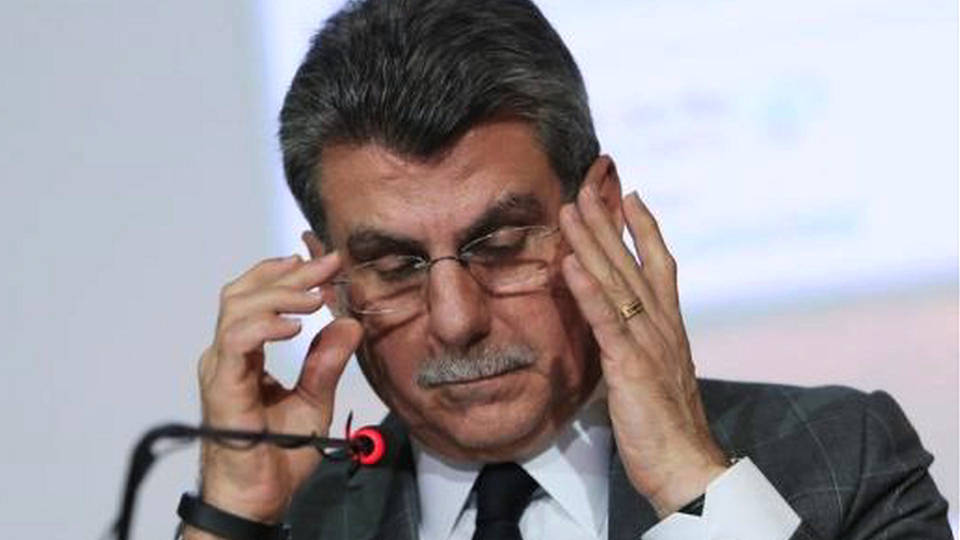
In Brazil, a key figure in the interim government has resigned after explosive new transcripts revealed how he plotted to oust President Dilma Rousseff in order to end a corruption investigation that was targeting him. The transcripts, published by Brazil’s largest newspaper, Folha de São Paulo, document a conversation in March, just weeks before Brazil’s lower house voted in favor of impeaching President Rousseff. Romero Jucá, who was then a senator but became a planning minister after Rousseff’s ouster, was speaking with a former oil executive, Sérgio Machado. Both men had been targets of the so-called "Car Wash" investigation over money laundering and corruption at the state-controlled oil firm Petrobras. In the conversation, the men agree that ousting President Rousseff would be the only way to end the corruption probe. Jucá notes the impeachment would "end the pressure from the media and other sectors to continue the Car Wash investigation." He also says he has spoken with military commanders, who are supporting the plan and who are "monitoring the Landless Workers Movement," which supports policies of Rousseff’s party. And Jucá says he has secured involvement by justices of the Brazilian Supreme Court, saying "there are only a small number" of justices he has not had access to. Writing for The Intercept, Pulitzer Prize-winning journalist Glenn Greenwald said, "The transcripts provide proof for virtually every suspicion and accusation impeachment opponents have long expressed about those plotting to remove Dilma from office." On Monday, the planning minister said his comments were taken out of context, but he would step down. Meanwhile, as Brazil’s interim foreign minister visited Argentina, protesters gathered in Buenos Aires to condemn Rousseff’s ouster as a coup.
Mateo Alves: "This is a coup which has been made legitimate by the (Brazilian) National Congress. But it is not legitimate, it is illegal. It is a coup to put those corrupt criminals in power."
TOPICS:
Brazil
Baltimore Officer Acquitted in Freddie Gray Police Custody Death
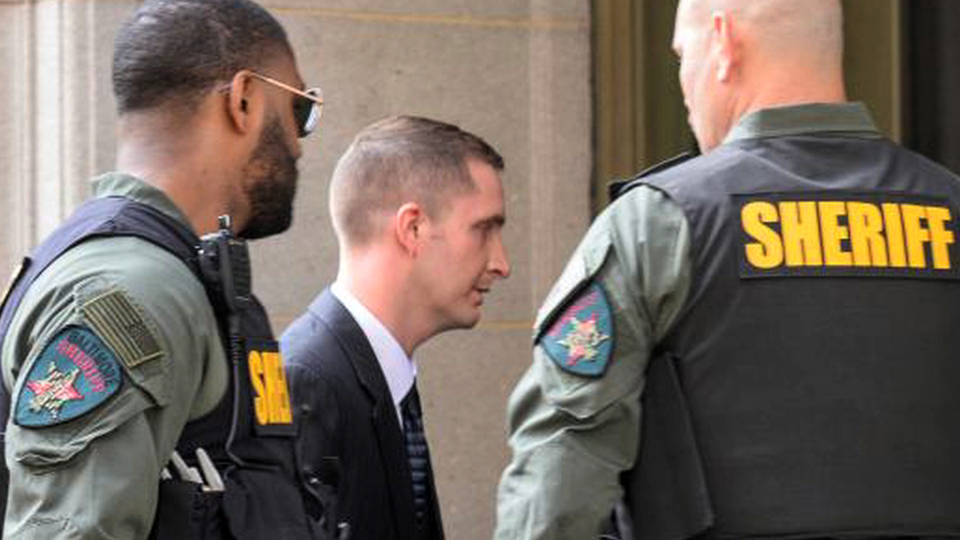
A Baltimore police officer has been acquitted on all charges for his role in the arrest of Freddie Gray, who died of spinal injuries last year after he was arrested and transported in a police van. Officer Edward Nero faced misdemeanor charges of second-degree assault, reckless endangerment and two counts of misconduct in office. A total of six officers were charged; four were directly charged in Gray’s death. Judge Barry Williams handed down the verdict in a bench trial on Monday, ruling that "the state has not met its burden" to prove Nero’s guilt "beyond a reasonable doubt." The ruling was met with little surprise from the community in a case that many said was the state’s weakest. Gray family attorney Billy Murphy reacted to the news.
Billy Murphy: "My information is that they’re reacting to this the same way they reacted to everything else. They’re reacting calmly. The judge gave detailed reasons for why he thought the evidence was insufficient and why the law did not compel a conviction in this case. You couldn’t have asked for a better judge to do it. He was a local prosecutor here for many years. He was a federal prosecutor of corrupt cops for many years. And he demonstrated convincingly that he was not and would not be swayed by any element of the community’s preconceived notions about what the result ought to be."
TOPICS:
Freddie Gray
Police Brutality
Supreme Court Sides with Black Man Sentenced to Death by All-White Jury
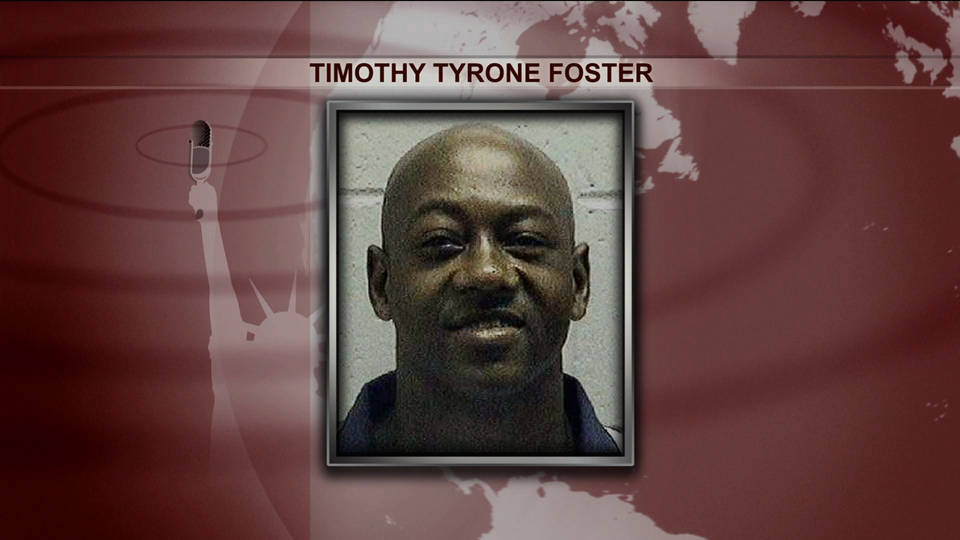
The Supreme Court has overturned the death sentence of an African-American man sentenced to die by an all-white jury in Georgia 29 years ago. Timothy Tyrone Foster was convicted of killing a white woman in 1986. Records revealed prosecutors marked the names of African-American jury candidates with a "B" and highlighted them in green, their race was circled on questionnaires, and all were placed on a list marked "Definite NOs." In one case, an investigator hired by the prosecution wrote, "if it comes down to having to pick one of the black jurors, [this one] might be okay." In striking down Timothy Tyrone Foster’s death sentence Monday, Supreme Court Chief Justice John Roberts concluded, "The focus on race in the prosecution’s file plainly demonstrates a concerted effort to keep black prospective jurors off the jury." Foster will likely face a retrial. The Supreme Court’s decision in Foster’s favor was seven to one, with the sole dissenting voice coming from the court’s only African-American justice, Clarence Thomas.
TOPICS:
Georgia
Death Penalty
Supreme Court
Yemen: ISIS Bombing Kills 40 Army Recruits; Cluster Bomb Found in Village
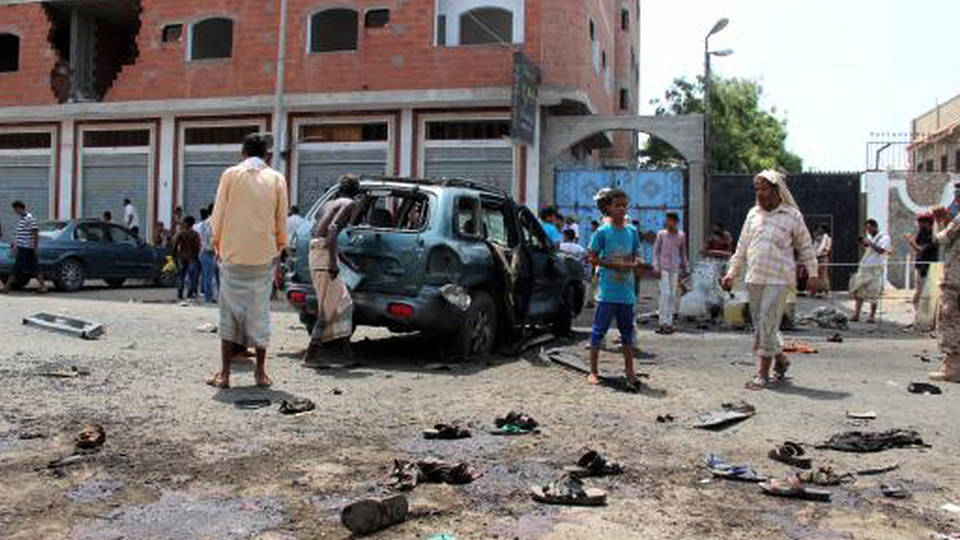
In Yemen, ISIS has claimed responsibility for an explosion that killed at least 40 Yemeni army recruits in the southern city of Aden. The attack hit recruits as they lined up to enlist. Aden serves as the temporary capital of the Saudi-backed Yemeni administration, which is fighting Houthi rebels. Meanwhile, a British-made cluster bomb has been found in a Yemeni village, bolstering reports the Saudi-led, U.S.-backed coalition fighting the Houthis has been dropping the banned weapons. Amnesty International found the unexploded bomb in northern Yemen. Cluster bombs contain bomblets which fan out over a wide area and often fail to explode until civilians pick them up later.
TOPICS:
Yemen
Greek Authorities Begin Clearing Thousands from Idomeni Refugee Camp
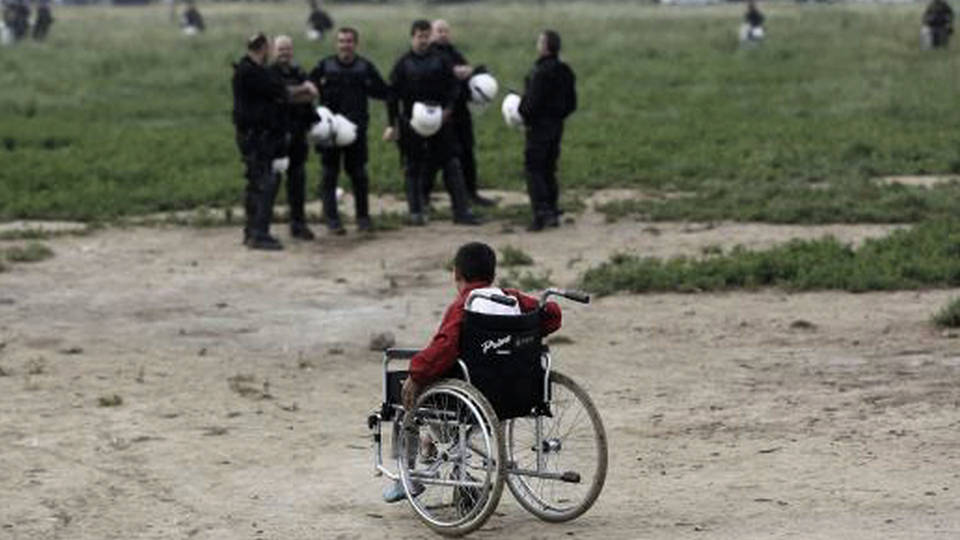
Greek authorities have begun clearing thousands of stranded refugees from a makeshift camp along the border with Macedonia. At least 8,400 people have been camped at Idomeni after Macedonia restricted and then shut down its border. Refugees have sought to remain in the area, hoping to cross with smugglers or wait for the border to reopen so they can continue their route to other parts of Europe. But earlier today, hundreds of riot police descended on the camp to evict them and transport them to processing stations further south.
TOPICS:
Greece
Refugees
Obama Praises TPP Trade Deal During Visit to Vietnam
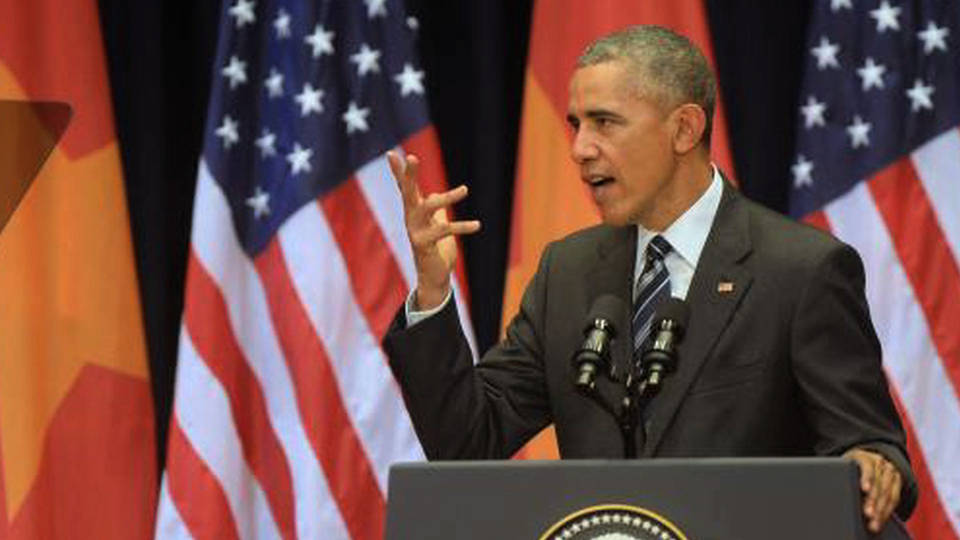
President Obama sought to drum up support for the Trans-Pacific Partnership trade deal as he continues his visit to Vietnam. The pact among 12 Pacific Rim countries, including Vietnam, appears unlikely to pass the U.S. Congress before the November election. All three presidential candidates have opposed it amid a wave of public protest by those who say it benefits corporations at the expense of health and environmental regulations. But Obama said he believed the TPP would one day pass.
President Barack Obama: "Moreover, I support TPP because of its important strategic benefits. Vietnam will be less dependent on any one trading partner and enjoy broader ties with more partners, including the United States."
TOPICS:
Obama
TPP
Vietnam
Okinawa Governor Requests Meeting with Obama After Ex-Marine's Arrest for Murder
Later this week Obama heads to Japan. He will become the first sitting U.S. president to visit Hiroshima, where the U.S. dropped a nuclear bomb toward the end of World War II. The governor of Okinawa, which houses about two-thirds of the 50,000 U.S. troops currently stationed in Japan, has requested a direct meeting with Obama. The request by Takeshi Onaga, who was elected on a platform of removing a U.S. airbase from the island, comes after last week’s arrest of a former marine for the murder of a Japanese woman. For decades, Okinawa residents have called for the expulsion of U.S. troops in large part over a history of sexual assaults. The governor spoke on Monday.
Gov. Takeshi Onaga: "Over the last several years, we have heard nearly a hundred times that there will be a full enforcement of discipline and a thorough plan to prevent this from happening again, but the reality is that nothing has changed."
TOPICS:
Japan
Obama
Austria: Far-Right Candidate Narrowly Defeated in Presidential Race
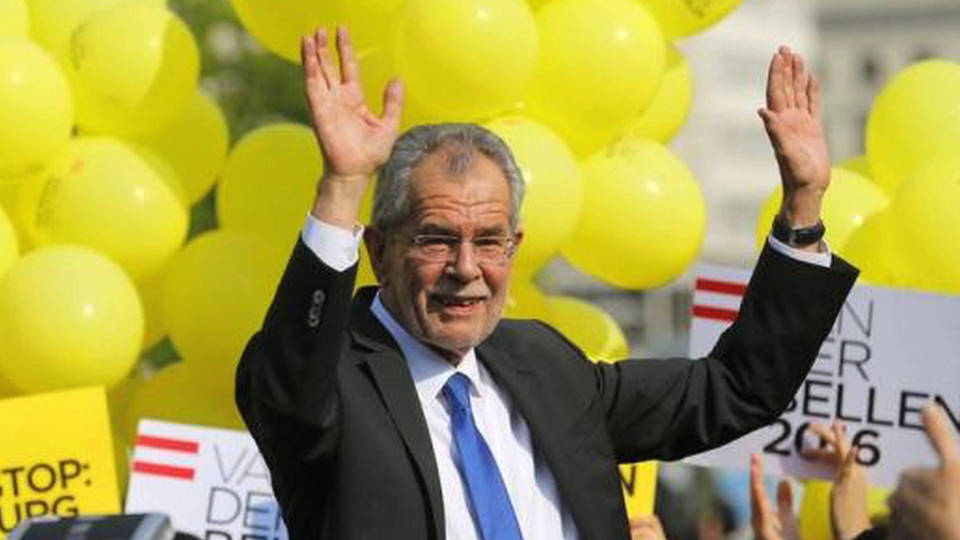
In Austria, a former Green Party leader has defeated his far-right opponent by a narrow margin in the presidential race. Alexander Van der Bellen won 50.3 percent of the vote, defeating far-right candidate Norbert Hofer, who won 49.7 percent. Hofer ran on an anti-migrant platform and would have become the first far-right head of state elected in Europe since 1945.
Sanders Names Cornel West, Bill McKibben to DNC Platform Committee

The Democratic National Committee has allowed Vermont Senator Bernie Sanders to appoint five members to the committee that authors the party’s platform. Democrats said Clinton was allowed to pick six while Sanders picked five, based on the number of popular votes they have each won to date. DNC Chair Debbie Wasserman Schultz will choose four members. Sanders chose the scholar and racial justice activist Cornel West; leading environmentalist and 350.org co-founder Bill McKibben; Native American activist Deborah Parker; Minnesota Congressmember Keith Ellison, who chairs the Congressional Progressive Caucus; and Palestinian rights activist and scholar James Zogby, who founded the Arab American Institute.
TOPICS:
2016 Election
Democratic Party
Bernie Sanders
Purvi Patel Appeals 20-Year Sentence for What She Says was a Miscarriage

Attorneys for an Indiana woman sentenced to 20 years in prison for what she says was a miscarriage have asked the Indiana Court of Appeals to overturn her sentence. Last year Purvi Patel was convicted of feticide and neglect of a dependent, becoming the first person in U.S. history sentenced to prison for what the state said was an attempt to end her own pregnancy. Patel arrived at a hospital bleeding, and later acknowledged disposing of her stillborn fetus in a dumpster. Prosecutors accused her of taking abortion-inducing pills, even though there were no drugs found in her system, and used a discredited "float test" to argue the fetus was born alive. In a statement, National Advocates for Pregnant Women said: "[We support] Ms. Patel because we believe that there is no point in pregnancy when a woman should lose her civil and human rights. We know that arresting or bringing criminal charges against people for ending a pregnancy, experiencing a miscarriage or stillbirth, or for being pregnant and giving birth, puts all pregnant people at risk."
Anti-Nuclear Activist Michael Mariotte Dies at 63
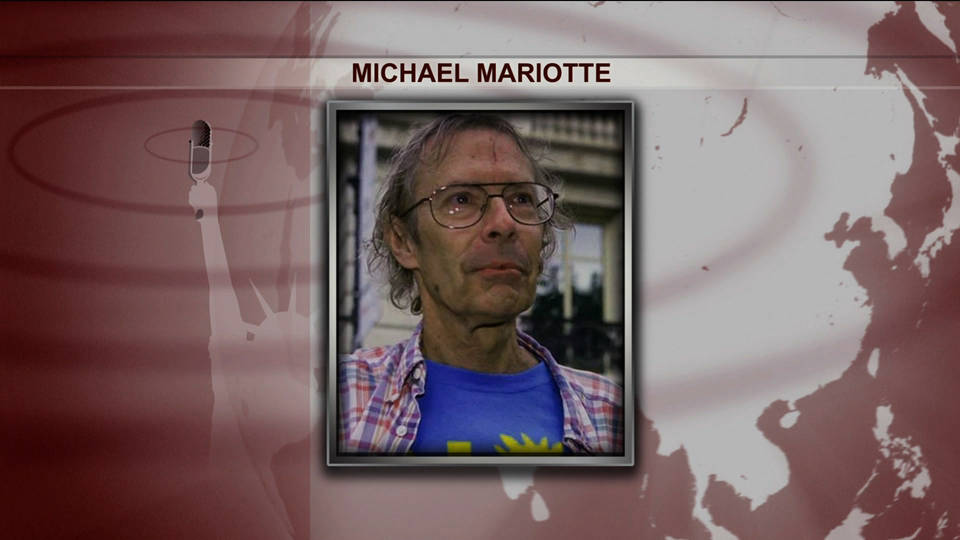
And the leading anti-nuclear advocate Michael Mariotte has died at the age of 63. Mariotte served as executive director of the Nuclear Information and Resource Service for three decades, leading successful campaigns to defeat two nuclear facilities and uphold restrictions on the transportation of radioactive waste. He also co-founded the newspaper that became the Washington City Paper. Mariotte died of pancreatic cancer at home in Kensington, Maryland, on May 16.
TOPICS:
Nuclear Power
Donate today:
Follow:




SPEAKING EVENTS

5/24 Brooklyn, NY
6/11 Chicago, IL
6/25 New York, NY
7/29 Provincetown, MA
7/30 Martha's Vineyard, MA
more
NEW BOOK

Chomsky: Today's GOP is a Candidate for Most Dangerous Organization in Human History—Part 2
207 West 25th Street, 11th Floor
New York, New York 10001, United States
---------------------
---------------------

No comments:
Post a Comment